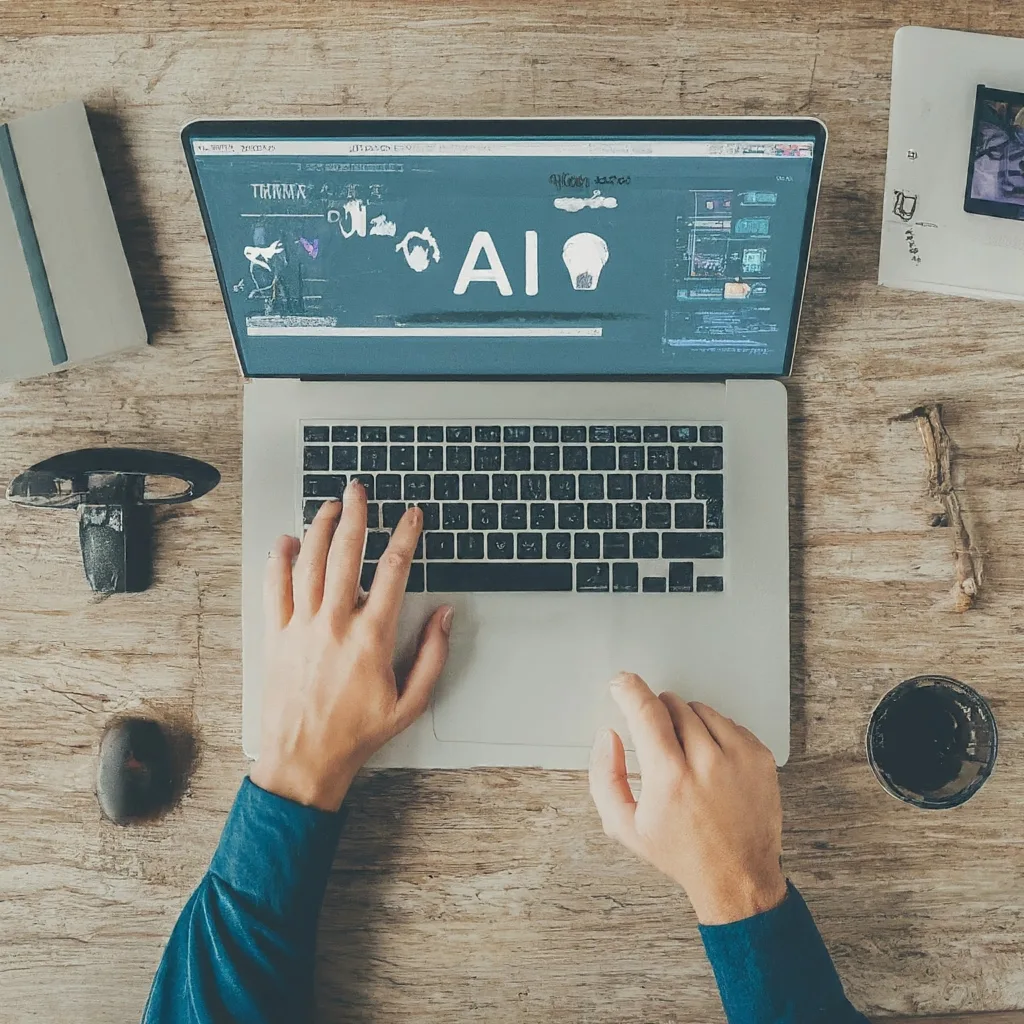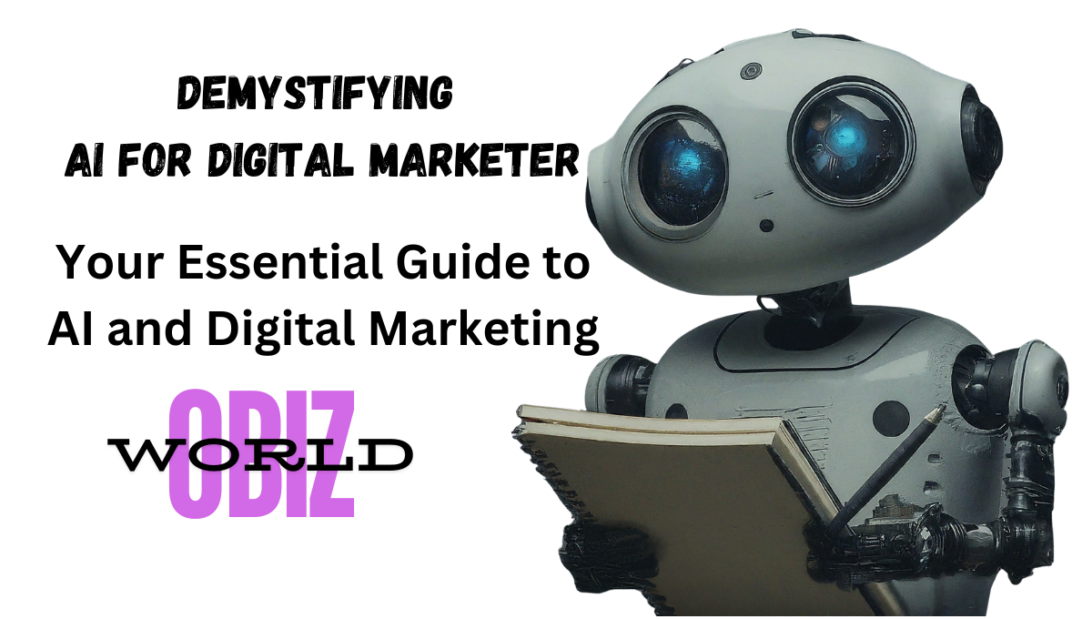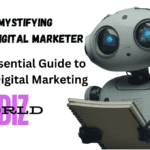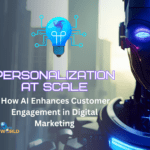Your Essential Guide to AI and Digital Marketing
Welcome to the era of AI in Digital Marketing!
You’ve probably heard whispers of AI’s transformative potential if you’re a digital marketer. But what exactly is AI, and how can it supercharge your campaigns? In this comprehensive guide, we’ll break down the essential AI concepts you need to know, answer burning questions from Google, and empower you to leverage AI for marketing success.
Let’s Demystify AI and Digital Marketing in 2024
Table of Contents
- Your Essential Guide to AI and Digital Marketing
- Unlocking the Power of Machine Learning in Marketing
- Predictive Analytics: Your Crystal Ball for Customer Behavior
- Recommendation Engines: The Secret to Personalized Shopping
- Customer Segmentation: Divide and Conquer Your Audience
- Mastering Natural Language Processing for Marketing Magic
- Chatbots and Virtual Assistants: Your 24/7 Customer Service Team
- Sentiment Analysis: Decoding the Voice of Your Customers
- Content Generation: Unleash Your Inner Wordsmith (With AI Help)
- Harnessing Computer Vision for Visual Marketing
- Image Recognition: See Your Brand Through Your Customers’ Eyes
- Visual Search: The Next Frontier of E-Commerce
- Augmented Reality (AR): Try Before You Buy
- Frequently Asked Questions About AI in Marketing
- How can businesses measure the impact of AI on marketing?
- What are the potential risks and limitations of using AI in marketing?
- Can small teams utilize AI to support their marketing efforts?
- What are some best practices for integrating AI into my overall marketing strategy?
- The Future of AI in Digital Marketing: A Glimpse into Tomorrow
- Conclusion:
Unlocking the Power of Machine Learning in Marketing
Machine learning (ML) isn’t just for sci-fi movies anymore. It’s the engine behind many marketing tools you already use. At its core, ML allows systems to learn from data, identify patterns, and make predictions or decisions without explicit programming.

Predictive Analytics: Your Crystal Ball for Customer Behavior
ML-powered predictive analytics crunches vast amounts of customer data to forecast future actions. This enables you to:
Target the Right People:
Identify customers most likely to purchase, churn, and target desired offers.
Personalize Experiences:
Tailor content and offers based on individual preferences and behaviors.
Optimize Campaigns:
Allocate resources more effectively by focusing on high-potential segments.
Recommendation Engines: The Secret to Personalized Shopping
Ever wonder how Amazon seems to know exactly what you want? That’s ML-powered recommendation engines at work. By analyzing your browsing and purchase history, they suggest products you’re likely to love, boosting engagement and sales.
Customer Segmentation: Divide and Conquer Your Audience
ML algorithms slice and dice your audience into distinct groups based on demographics, behaviors, and interests. This allows you to:
Craft Targeted Messages:
Create marketing that resonates with specific segments.
Tailor Product Offerings:
Develop products and services that meet the unique needs of each group.
Improve Customer Satisfaction:
Deliver personalized experiences that make customers feel understood.
Mastering Natural Language Processing for Marketing Magic
Natural Language Processing (NLP) is the wizard behind computers understanding and generating human language. This opens up exciting possibilities for marketers to demystify AI and Digital Marketing in 2024.

Chatbots and Virtual Assistants: Your 24/7 Customer Service Team
NLP-powered chatbots can handle customer inquiries, provide support, and even guide them through the sales funnel. They free up your human team to focus on complex tasks while providing instant, personalized assistance to customers
Sentiment Analysis: Decoding the Voice of Your Customers
NLP can analyze social media posts, reviews, and other text data to gauge customer sentiment. This allows you to:
Identify Brand Advocates:
Discover loyal customers who sing your praises online.
Address Negative Feedback:
Quickly respond to complaints and resolve issues before they escalate.
Monitor Brand Reputation:
Track overall sentiment to understand how your brand is perceived.
Content Generation: Unleash Your Inner Wordsmith (With AI Help)
AI writing tools can generate marketing copy, social media captions, and even product descriptions. While they won’t replace human creativity entirely, they can be valuable for brainstorming ideas and producing first drafts.
Harnessing Computer Vision for Visual Marketing
Computer vision (CV) gives computers the ability to “see” and interpret visual information. This has a multitude of applications in marketing:

Image Recognition: See Your Brand Through Your Customers’ Eyes
CV can analyze images on social media to identify your brand logos, products, or user-generated content. This provides valuable insights into:
Brand Awareness:
Track how often your brand is mentioned visually online.
Campaign Performance:
Measure the impact of visual campaigns.
Customer Sentiment:
Analyze the emotions associated with your brand images.
For more information about this topic Read this also
Visual Search: The Next Frontier of E-Commerce
CV-powered visual search engines allow users to search for products using images instead of text. This is a game-changer for fashion, home decor, and other visually-driven industries.

Augmented Reality (AR): Try Before You Buy
CV is the backbone of AR experiences like virtual try-ons and furniture placement tools. These immersive experiences boost engagement, reduce returns, and enhance the customer journey.

Frequently Asked Questions About AI in Marketing
As AI becomes more prevalent in marketing, it’s natural to have questions. Let’s tackle some of the most common queries from Google:
How can businesses measure the impact of AI on marketing?
The core impact of AI marketing tools lies in leads and deals generated. However, there are numerous other metrics to consider, such as time saved on content production, website traffic, social media engagement, and customer satisfaction. Ultimately, AI should be contributing to your bottom line – whether through increased revenue, reduced costs, or improved efficiency.
What are the potential risks and limitations of using AI in marketing?
AI is not a magic bullet. Some potential risks and limitations include:
* Data Bias: AI models can inherit biases from the data they’re trained on, leading to discriminatory outcomes. It’s essential to use diverse and representative data and regularly audit AI algorithms for bias.
* Lack of Creativity: While AI can generate content, it may lack the nuance, creativity, and emotional intelligence of human-created content.
* Overreliance on Automation: Relying too heavily on AI can lead to a loss of human touch and personalized interactions, which are crucial for building strong customer relationships.
Can small teams utilize AI to support their marketing efforts?
Absolutely! Many AI tools are designed to be user-friendly and accessible to small businesses. You can find affordable options for content generation, social media management, email marketing, and even basic chatbots. Start small, experiment with different tools, and gradually scale up as you see results.
What are some best practices for integrating AI into my overall marketing strategy?
- Start with Clear Goals: Define specific objectives you want to achieve with AI, whether it’s increasing leads, improving customer engagement, or optimizing ad spend.
- Choose the Right Tools: Research and select AI tools that align with your goals and budget.
- Test and Iterate: Experiment with different approaches and measure the results to see what works best for your business.
- Don’t Forget the Human Touch: AI is a powerful tool, but it should complement, not replace, human creativity and empathy.
The Future of AI in Digital Marketing: A Glimpse into Tomorrow
In today’s rapidly evolving business landscape, organizations are increasingly relying on data-driven insights to inform their marketing decisions. The advent of artificial Read more
The AI revolution is just getting started. As technology continues to advance, we can expect even more exciting developments in the marketing landscape:
- Hyper-Personalization at Scale: AI will enable marketers to deliver highly personalized experiences to every customer, at every touchpoint.
- Predictive Marketing on Steroids: AI will predict customer behavior with unprecedented accuracy, allowing for proactive and preemptive marketing strategies.
- Enhanced Customer Service: AI-powered chatbots and virtual assistants will become even more sophisticated, providing seamless, 24/7 support.
- AI-Generated Content Creation: AI will continue to evolve, creating marketing content that is virtually indistinguishable from human-written copy.
- Ethical AI: The industry will focus on developing AI systems that are transparent, fair, and accountable.
Conclusion:
The AI landscape is constantly evolving, offering exciting opportunities for digital marketers who are willing to embrace change and adapt. By understanding the fundamentals of AI, staying abreast of emerging trends, and experimenting with different tools, you can harness the power of AI to drive your marketing campaigns to new heights.
Remember, AI is not here to replace you. It’s here to empower you. So, don’t be afraid to dive in, experiment, and discover the incredible potential that AI holds for your marketing success.
I hope this comprehensive blog post has provided you with a solid understanding of AI fundamentals and their applications in digital marketing. If you have any further questions, feel free to ask!




Its like you read my mind You appear to know a lot about this like you wrote the book in it or something I think that you could do with some pics to drive the message home a little bit but instead of that this is fantastic blog An excellent read I will certainly be back
Fantastic site Lots of helpful information here I am sending it to some friends ans additionally sharing in delicious And of course thanks for your effort